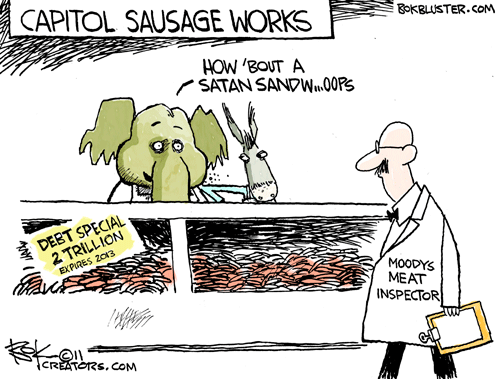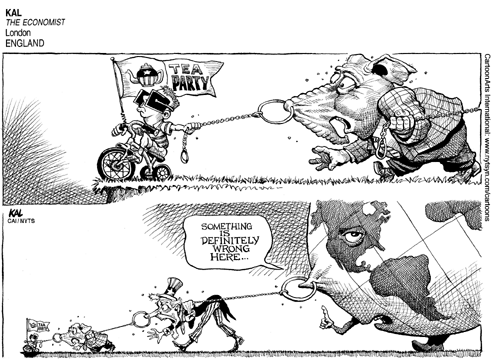“Punting the Pundits” is an Open Thread. It is a selection of editorials and opinions from around the news medium and the internet blogs. The intent is to provide a forum for your reactions and opinions, not just to the opinions presented, but to what ever you find important.
Thanks to ek hornbeck, click on the link and you can access all the past “Punting the Pundits”.
The Sunday Talking Heads:
I strongly suspect that there will be only one topic discussed on any of these programs. Go to the park or the beach. It may be your last chance as most public facilities will be closed due to the coming austerity
This Week with Christiane Amanpour: This week’s guests are White House Senior Advisor David Plouffe and ABC News Chief Political Correspondent George Stephanopoulos. Then, if you can stomach watching, Sen. Lindsey Graham (R-SC) in an exclusive interview.
The guests on the roundtable are ABC News Chief Political Correspondent George Stephanopoulos, ABC’s George Will, Nobel Prize-winning economist and New York Times columnist Paul Krugman, and Grover “Lord Voldemort” Norquist, President of Americans for Tax Reform.
New York City Police Commissioner Ray Kelly discusses security and ABC News’ David Muir in the Horn of Africa on the devastating famine.
Face the Nation with Bob Schieffer: Guests are Senate Minority Leader Sen. Mitch “Human-Hybrid Turtle” McConnell (R-KY), and Democratic Policy Committee Chairman Sen. Chuck “Wall St.’s Puppet, Schumer (D-NY).
The Chris Matthews Show: This week’s guests Andrea Mitchell, NBC News Chief Foreign Affairs Correspondent, Howard Fineman, The Huffington Post Senior Political Editor, Michael Duffy, TIME Magazine Assistant Managing Editor and Nia-Malika Henderson, The Washington Post National Political Reporter who will discuss:
Why the GOP thinks this debt chaos helps them beat Barack Obama in 2012 and will Rick Perry be the GOP Nominee?
Meet the Press with David Gregory: Guests are White House Senior Advisor David Plouffe, Sen. Claire McCaskill (D-MO) and Sen. John Thune (R-SD). Joining the roundtable are Former Governor of Michigan, Jennifer Granholm (D), Rep. Raul Labrador (R-ID), the host of CNBC’s “Mad Money” Jim Cramer, and NBC’s Tom Brokaw.
State of the Union with Candy Crowley: Guest host Gloria Borger will talk to Senate Minority Leader Mitch McConnell (R-KY), Sen. Chuck Schumer (D-NY) and Director of the National Economic Council and Assistant to the President for Economic Policy Gene Sperling and Mark Zandi, chief economist for Moody’s Analytics.
Fareed Zakaris: GPS:Fareeh is pissed at the tea party so watching this might be fun just to hear him vent
His primary interview will be with International Monetary Fund, Christine Lagarde on the US debt crisis.
Jeff Cohen:
Mainstream Reporters: Too Close to the Field and Teams to Get the Debt Story
If you were a spectator in a sky box seat looking directly down on the Washington debt debate, you’d be seeing a contest both narrow and off to one edge of the field — like watching a football game being played entirely between the 10-yard line and the goal line.
The big items that added trillions to the debt are not even on the field of debate. Because the two teams are not contesting them.
- Wars: When Obama expanded the Afghan war and asked for the largest military budget in world history, the GOP largely applauded. It was bipartisan.
- Bush Tax Cuts for the Wealthy: Obama extended them in December.
- Bank Bailouts: Bipartisan.
- Declining Tax Revenue: Resulted from recession and financial meltdown caused by years of bipartisan (Reagan/Clinton) deregulation of Wall Street. And by big companies like General Electric (whose CEO is Obama’s jobs chairman) dodging their taxes.
That’s the broad view — a perspective that sees our country in extreme debt and extremist “debate” because the leaders of the two teams collaborated in putting it there.
But this would not be your view if you were a mainstream reporter. Because reporting in elite U.S. media is not so much about relaying obvious and important facts as it is about positioning.
Ken Sofer: World Reacts to Debt Ceiling Debacle: “Irresponsible,” “Worst Kind of Absurd Theatrics”
The rhetoric over raising the debt ceiling has become increasingly harsh as Democratic and Republican congressional leaders trade barbs back and forth. But as the U.S. inches closer to defaulting on its debts for the first time in history, criticism of Congress is starting to come from beyond our own borders. From France and Germany to China and India, countries around the world are angry that American politicians play with the possibility of a U.S. default like a yo-yo with little regard for the international economic system that depends on American solvency.
Despite China’s traditional preference of staying out of the domestic affairs of other nations, senior Chinese officials’ frustrations are growing louder and louder. Stephen Roach, the non-executive chairman of Morgan Staley Asia, said senior Chinese officials told him the debt ceiling debte in the U.S. is “truly shocking.” “We understand the politics,” a Chinise official said, “but your government’s continued recklessness is astonishing.” And newspapers around the world are voicing discontent with Congress’s handling of the debt ceiling . . .
Frank Bruni: Taxes, and a Dangerous Purity
WHAT does the face of antitax absolutism look like?
It has a tentative beard, more shadow than shag, like an awkward weigh station on the road from callow to professorial. It wears blunt glasses over narrowed eyes that glint mischievously, and its mouth is rarely still, because there’s no end to the jeremiads pouring forth: about the peril of Obama, the profligacy of Democrats and the paramount importance of opposing all tax increases, even ones that close the loopiest of loopholes.
It belongs to Grover Norquist, and if you hadn’t seen it before, you probably spotted it last week, as he pinged from CNN to MSNBC to Fox, reveling in the solidarity Republicans had shown against any new revenue. The country was lurching toward a possible default, but Norquist was riding high. In between television appointments on Thursday, he met me for breakfast near Times Square.
New York Times Editorial: Meanwhile, Back in the Economy
The economy is in trouble, and Washington – fixated on budget slashing at a time when the economy needs more spending – seems determined to make matters worse.
On Friday, in the midst of the debt limit battle, the government reported that economic growth nearly ground to a halt in the first quarter of 2011, a far worse performance than previously estimated. The second-quarter growth number, a feeble 1.3 percent annual rate, is not nearly enough to stop unemployment from rising even higher.
Nor are there persuasive signs that absent more government support, conditions will turn around anytime soon. Indeed, they are bound to worsen if Congress approves deep near-term spending cuts as part of a debt-limit deal while letting relief and recovery measures
Michael Schwerner and Andrew Goodman, both white New Yorkers, had traveled to heavily segregated Mississippi in 1964 to help organize civil rights efforts on behalf of the Congress of Racial Equality (CORE). The third man, James Chaney, was a local African American man who had joined CORE in 1963. The disappearance of the three young men led to a massive FBI investigation that was code-named MIBURN, for “Mississippi Burning.”


 The USS Nautilus was constructed under the direction of U.S. Navy Captain Hyman G. Rickover, a brilliant Russian-born engineer who joined the U.S. atomic program in 1946. In 1947, he was put in charge of the navy’s nuclear-propulsion program and began work on an atomic submarine. Regarded as a fanatic by his detractors, Rickover succeeded in developing and delivering the world’s first nuclear submarine years ahead of schedule. In 1952, the Nautilus’ keel was laid by President Harry S. Truman, and on January 21, 1954, first lady Mamie Eisenhower broke a bottle of champagne across its bow as it was launched into the Thames River at Groton, Connecticut. Commissioned on September 30, 1954, it first ran under nuclear power on the morning of January 17, 1955.
The USS Nautilus was constructed under the direction of U.S. Navy Captain Hyman G. Rickover, a brilliant Russian-born engineer who joined the U.S. atomic program in 1946. In 1947, he was put in charge of the navy’s nuclear-propulsion program and began work on an atomic submarine. Regarded as a fanatic by his detractors, Rickover succeeded in developing and delivering the world’s first nuclear submarine years ahead of schedule. In 1952, the Nautilus’ keel was laid by President Harry S. Truman, and on January 21, 1954, first lady Mamie Eisenhower broke a bottle of champagne across its bow as it was launched into the Thames River at Groton, Connecticut. Commissioned on September 30, 1954, it first ran under nuclear power on the morning of January 17, 1955.
 Fifty-six congressional delegates in total signed the document, including some who were not present at the vote approving the declaration. The delegates signed by state from North to South, beginning with Josiah Bartlett of New Hampshire and ending with George Walton of Georgia. John Dickinson of Pennsylvania and James Duane, Robert Livingston and John Jay of New York refused to sign. Carter Braxton of Virginia; Robert Morris of Pennsylvania; George Reed of Delaware; and Edward Rutledge of South Carolina opposed the document but signed in order to give the impression of a unanimous Congress. Five delegates were absent: Generals George Washington, John Sullivan, James Clinton and Christopher Gadsden and Virginia Governor Patrick Henry.
Fifty-six congressional delegates in total signed the document, including some who were not present at the vote approving the declaration. The delegates signed by state from North to South, beginning with Josiah Bartlett of New Hampshire and ending with George Walton of Georgia. John Dickinson of Pennsylvania and James Duane, Robert Livingston and John Jay of New York refused to sign. Carter Braxton of Virginia; Robert Morris of Pennsylvania; George Reed of Delaware; and Edward Rutledge of South Carolina opposed the document but signed in order to give the impression of a unanimous Congress. Five delegates were absent: Generals George Washington, John Sullivan, James Clinton and Christopher Gadsden and Virginia Governor Patrick Henry.
Recent Comments